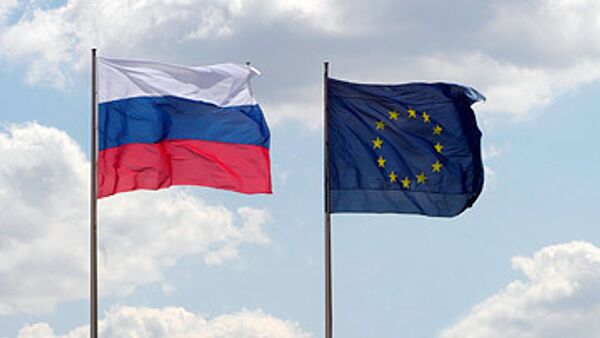MOSCOW. (RIA Novosti international news commentator Ivan Zakharchenko) - Europe is almost a single state now, not only with common finances, common borders and common economic space but also with one president and one foreign minister.
How much will this reform, which was made possible by the ratification of the Lisbon Treaty by 27 European countries, benefit Russia and its relations with the future Europe? To begin with, the presidential powers of the European Union chairman make his/her authority more centralized and simplify decision-making and political agreement.
Is that good for Russian-European relations? No doubt, it is. Such a state of affairs is better and more effective than the biannual changing of EU presidency and realignment of relations with each of the 27 partners. Power structures in the European Union will now be stronger, political observers say, and talks with a centralized leadership are easier to hold. Therefore, top-level talks between Russia and the EU will be made easier when a Russian president deals with a single European president, rather than with leaders of EU countries holding the rotating EU presidency.
Now a few words about the Belgian Prime Minister, who has become such a European leader: Herman Van Rompuy is known above all as a politician who stopped Belgium's breakup. Experts describe him as pragmatic, diplomatically skilled, able to compromise, and a man of strong common sense. This, too, will contribute to businesslike and constructive talks with him and the EU in general.
The introduction of the post of European foreign minister, or deputy chairman of the European Commission, high EU representative for foreign affairs and security policy, also simplifies diplomatic dealings with the Europeans. Agreeing positions on various issues will be simpler now.
The appointment of Catherine Ashton as European foreign minister has come as a surprise, but it was a pleasant surprise for Russia. This, however, does not mean that things will now move swimmingly between Russia and Europe. Moscow has no such illusions.
"The people elected to the two new posts in the European Union lack any leadership experience," Sergei Karaganov, head of Russia's Council on Foreign and Defense Policy, and deputy director of Russian Academy of Sciences' Institute of Europe, told RIA Novosti.
He expects the EU "to continue drifting in international politics." Herman Van Rompuy and Catherine Ashton are able to compromise and will smooth away sharp edges in relations with Russia. "But they will not take these relations to new heights until both sides realize what they want from each other," the analyst believes.
In the short term, "little if anything will change in Russian-European relations, because the EU is a very inert system," another Russian analyst, Alexei Kuznetsov, head of the Center for European Studies at the Institute of World Economy and International Relations, told RIA Novosti.
According to him, in an energy dialogue it is easier to negotiate with each separate country than with a bureaucratic behemoth such as Europe.
Nothing points to a breakthrough in EU-Russia relations, Kuznetsov believes. "The initiative must come from the EU," he said.
The existing visa regime hampers tourism and academic and business contacts with Russia. The suggested formulas of visa simplification procedure are "nothing more than a screen with no actual simplification," he is convinced. Another problem is trade protectionism, which the new European power structures can weaken, but never get rid of completely.
"The Europeans should be aware of the need (to ease visa restrictions and lift barriers in trade), but there is no such awareness as yet. The Europeans cannot see that visas are setting Europe and Russia apart, dividing them into friends and foes. They are refusing to listen to us," Kuznetsov said.
So what is Russia to expect from the EU reform and the new players able to compromise but lacking the charisma of authority in the European structures? No doubt, changes in Russian-European relations, above all, in dialogue, will come, but no one expects sweeping changes.
The opinions expressed in this article are the author's and do not necessarily represent those of RIA Novosti.



